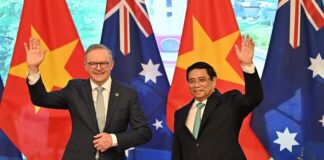As China’s economy slumps, deep running social tensions are threatening to explode writes Tim Erickson
China’s rulers fear that their grip on power is threatened by global economic turmoil. President Hu Jintao recently said that the crisis is a “is a test of our party’s capacity to govern”. The fear is not simply about China’s lucrative export industries grinding to a halt. Beijing’s nightmare scenario is the nation’s workers rising in rebellion against unemployment and hunger.
When the financial crisis first hit the US and Europe, many economists and governments thought China might be the savior of the world economy. Its much celebrated “economic miracle” has seen the economy grow at an average rate of 10 per cent annually for the past 25 years.
China has a mountain of cash reserves, they said. It has a massive domestic market that can pick up the slack when exports decline, they said. Now no one is talking about a Chinese road to global recovery and the ruling class is very much absorbed by domestic strife.
Premier Wen Jiao Bao said in November that the “impact of the global financial crisis is much worse than anything we expected”. With soaring unemployment and strikes breaking out in the south east, now the central question is: can Beijing control the rage spreading across the country?
China’s economic crisis has been dramatically played out on the Hong Kong and Shanghai stock exchanges over the last few months. The convulsions on the stock markets reflect serious weaknesses in the real economy that predate the onset of the global financial meltdown. Over the last year electricity generation dropped 9.6 per cent, vehicle output declined 15.9 per cent and raw steel output fell 12.4 per cent. The wheels of China’s heavy industry are clearly slowing and this is cutting deeply into profits. The profits of the state owned enterprises slumped 26 per cent in the first 11 months of 2008.
Underpinning the decline in profits is what Marxists described as the tendency of the rate of profit to fall. For Marx the source of wealth is labour—workers. But competition encourages firms to invest in capital—machinery and equipment. If over time there is more investment in capital than labour Marx argued that the ”organic composition of capital” would rise potentially resulting in economic crisis. This is what has happened in China. There has been massive investment in capital since the 1980s but over the same period employment growth has slowed.
Annual growth fell from 13 per cent in 2007 to 9 per cent last year. The World Bank has cut its forecast for this year’s growth in China to 6.5 per cent. Financial institutions Goldman Sachs and Morgan Stanley have made similar predictions. And according to the Chinese Academy of Social Sciences the unemployment rate reached 9.4 per cent at the end of last year.
China’s export industries, heralded as the great success story of the market reforms, are falling apart. Exports fell 17.5 per cent from January last year, a figure that has taken many economic commentators by surprise. Twelve months ago the streets of the manufacturing cities in the south east were lined with banners offering walk-in jobs. Those same streets now have “factories to lease” banners. This is a grave situation for the government. Forty percent of China’s growth comes from exports.
Despite China’s economic growth, for ordinary people still have to struggle to get by.
For example market forces unleashed in the early 1980s by Deng Xiaoping’s “open door policy” have left China’s health system in ruins.
In the absence of a functioning public health system many Chinese people desperately scramble to save money to carry them through any episode of sickness. In the 1980s, when the health system was mostly intact, household consumption amounted to more than half China’s GDP. Now it is just over a third.
The government’s four trillion RMB (AUS $920 billion) stimulus package announced in early November does not seem like anywhere near enough to revive consumer confidence or growth. Furthermore, it is not clear whether the money being spent will promote self-sustaining growth or merely result in brief, isolated bouts of activity.
Chinese capitalism is already suffering from overproduction. For example, the steel industry may have almost 30 per cent more production capacity than it is able to sell.
Those elements of the stimulus package aimed at jolting corporations back to life may simply aggravate the problem of overproduction.
Overseas markets for Chinese products are drying up and Chinese consumers, absorbed by the struggle to access quality healthcare and the need to save for retirement, are in no position to soak up the excess goods.
Migrant workers
The crisis in China’s industries has been most acutely felt by the 150 million migrant workers who have moved from poor rural provinces like Anhui, Hunan and Sichuan to work in the coastal cities. Outside railway stations thousands of migrant workers sit with blankets and suitcases waiting for trains back to their homes. Last year up to nine million workers left coastal areas. The movement of workers to the city, described as one of the largest migrations in history, is now in reverse.
Provincial authorities are struggling to find enough grain to feed the armies of returning unemployed workers. Some workers will receive unemployment benefits but they can’t be transferred to rural areas if workers decide to return home after the closure of a factory.
The encouragement of growth in coastal areas at the expense of the rural interior has created economic backwaters where there is now little hope of finding work. It seems Beijing believed that rural communities could survive on the remittances sent back from relatives working on the coast. The market and the central government have failed millions.
It was an article of faith amongst Chinese economists that China needed to grow by at least 8 per cent a year to absorb graduating school and university students and provide jobs for the millions of migrant workers. Otherwise there would be social unrest. Localised battles between workers and peasants against employers and the state have already broken out.
Strikes
In early November a wave of taxi strikes hit three mainland cities. The strikes over fares and high rental fees have reportedly troubled Beijing. The strike in Guanzhou involved 70 per cent of the city’s 17,000 taxis. Some mainland labour commentators have described it as the largest industrial action since 1989.
Over recent months there has been a sharp rise in industrial action across Guandong province to defend jobs and secure back pay. The Guangzhou People’s Court reported that there has been a 75 per cent increase in industrial disputes. The court’s president described the growth as “dramatic”. It appears that workers have more confidence to take action since the introduction of labour laws requiring employers to negotiate with trade unions over compensation, wages and medical and unemployment benefits. The laws themselves are largely ineffective and the unions are hopelessly tied to the state but the laws have given workers a strong sense of their entitlements. When they exhaust all the legal channels they often take to the streets or engage in sit down strikes believing that the law is on their side.
The widespread anger towards neo-liberalism is combining with local grievances over corruption to create explosive uprisings.
In the impoverished province of Guizhou in June police attempted to prevent the son of government official being charged for murdering a girl. More than 10,000 people took part in angry demonstrations torching police and government buildings.
In November 2008 in Gansu province thousands rioted, angry that the earthquake resettlement scheme had not been justly implemented. Police arrested 30 people.
In February this year in Zhejiang province hundreds of migrant workers clashed with police after a police officer failed to assist a migrant worker struck by a car. The police in full riot gear wounded 100 protesters.
It is impossible to predict how the crisis will unfold in China. But we can be confident about a few things. Over the last 25 years the government has received broad support from many people because double digit growth has allowed them to have a reasonable diet and purchase white goods in department stores. Today growth has fallen to levels unable to absorb rapidly swelling unemployment. The bond between the people and Beijing is dissolving. The four trillion RMB stimulus package has done nothing to stop factories closing or encourage consumers to spend.
There are local battles flaring up across this huge country, and some, like the taxi driers strike, have the potential to link up workers in different cities. Hu Jintao is right. This year his “capacity to govern” will be severely tested.





